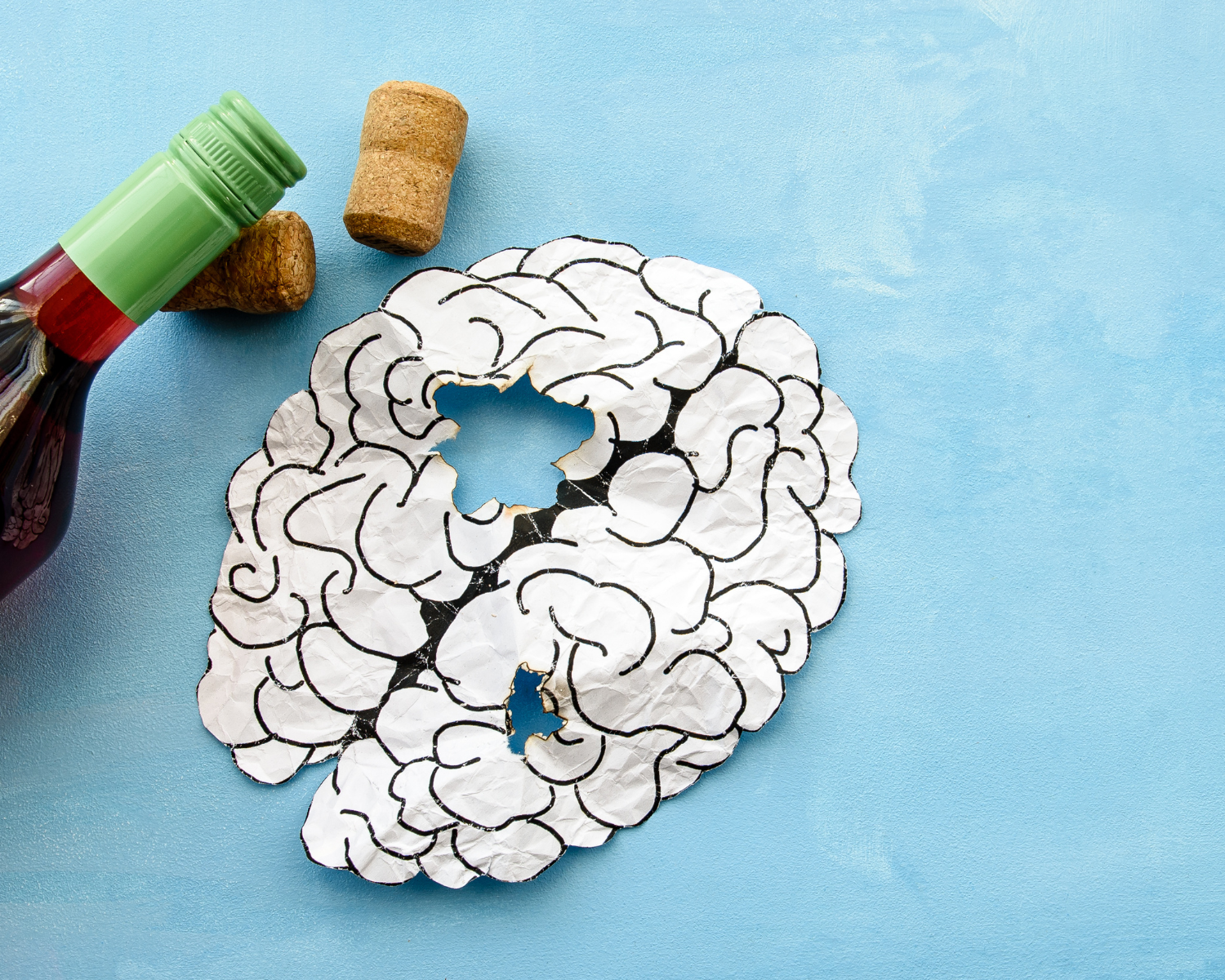
Alcohol's Toll on your Brain: Ranging from Mood to Memory
You might think that the only things you need to worry about when you drink alcohol regularly are gaining weight and feeling average for a few hours the morning after a great night out. However, there is increasing evidence showing that regular consumption of alcohol can have permanent damaging effects on the brain and may increase your risk of developing cognitive diseases later in life, such as Alzeimers and Dementia.
Below we discuss five harmful ways that alcohol affects your brain, from short-term to long-term effects, as well as some ways you can protect your brain from these harmful consequences.
1. Alcohol affects your mood and personality
Alcohol consumption interferes with several parts of your brain that impact your mood and personality. It changes the levels of dopamine, serotonin and other neurotransmitters in the brain, for example, while you are drinking your dopamine levels can increase giving you a feeling of confidence, motivation and a positive mood. However, after you have stopped drinking your levels are often lower than your usual baseline due to being depleted, which is why you can feel low, irritable and unmotivated. If you drink often then these effects can be more profound, whereby you only feel 'normal' and happy if you have had a drink.
Since alcohol also affects the quality of your sleep, you will usually be more tired the day after drinking than if you had not consumed any alcohol (even if you only had one or two glasses in the evening). Being tired can make you feel more moody on top of the neurotransmitter imbalance that alcohol causes - it has a snowballing effect.
On the extreme side, long-term alcoholism can cause certain personality disorders such as
Pellagra - this is a disease which is caused by a deficiency of vitamin B. Since long-term heavy drinking depletes your levels of vitamin B to dangerously low levels, this eventually impairs the nervous system and results in dementia. Dementia severely impacts your ability to think clearly, remember things such as family members, logical reasoning and it causes confusion. It can also change a person's personality when the disease becomes severe.
Korsakoff’s Syndrome - this disease is a type of psychosis associated with brain deterioration due to heavy drinking. Its main negative effects are short-term memory failure, imaginary memories, hallucinations, and agitation.
2. Alcohol inhibits your memory
Most people who have consumed alcohol will have experienced partial memory loss at least once in their lives when they have drunk too much alcohol. This is because when your blood alcohol level increases too much, it can affect your ability to form memories since it disrupts the part of your brain called the hippocampus.
Not only can alcohol temporarily affect your ability to form new memories, but it can also have long-term consequences with even moderate drinking (14-21 standard drink units per week). A study from 2017 found that the hippocampus region of the brain shrinks when alcohol is consumed regularly.
The results showed that people who drank an average of four standard drinks a day (defined as 'heavy drinkers') had nearly six times as much risk of brain shrinkage compared to people who don't drink alcohol. People who only drink 2-3 standard drinks per day (who are defined as 'moderate drinkers') still had three times as much risk of brain shrinkage compared to non-drinkers.
This brain shrinkage effect may be at least partially explained by the fact that drinking alcohol affects your body's ability to make new brain cells (called neurogenesis) thus when brain cells die they are not able to be replaced at the same rate.
In extreme cases, excessive regular drinking may increase the risk of someone developing the debilitating diseases of Alzheimers or Dementia which result in a significant degradation of the brain's ability to form new memories and recall past memories
Is the damage able to be reversed?
Thankfully, there is evidence that shrinkage of the hippocampus can start to reverse after just a few weeks of not drinking alcohol. If you feel that your memory is not as good as it used to be then you could try abstaining for a while - you will most likely notice an improvement in your memory and cognition.
3. Alcohol affects your judgement and can cause you to make poor decisions
As mentioned above, drinking alcohol affects certain neurotransmitters in the brain as well as the functioning of certain areas of the brain.
ll of these factors combine to result in decreased rational thinking and poor judgement.
The three main factors that affect your judgement are:
Dopamine - while you are drinking, levels of your 'feel-good' chemical increase which can make you feel over-confident when assessing the risk of certain activities or decisions. For example, did you ever send a drunken text thinking it was absolutely a great idea at the time, only to realise it wasn't the next day?
Norepinephrine - this neurotransmitter is also elevated when you drink. Since it is a stimulant, it helps to lower your inhibitions and increase your impulsivity, which makes it harder for you to think about the potential consequences of your actions before you do them.
Prefrontal cortex - this area of your brain is involved in rational decision-making and it is partially responsible for controlling your emotions. When you consume alcohol, it disrupts the functioning of prefrontal cortex and makes it harder for you to make rational, logical decisions, instead you act more on impulse and emotion. The more you drink, the more this part of your brain shuts down and the more you may make emotional decisions that you will regret later.
4. Alcohol can affect your voice both in the short-term and long-term
We all know when someone has had too much to drink as they start to slur their speech. When you drink alcohol, it affects two main brain regions associated with talking.
The first area (called the 'supplementary motor area') controls the many small muscles required to move your lips, mouth, throat, larynx and vocal cords to form words and sounds. The more alcohol you consume, the less control your brain has over the small muscles required to form speech and the harder it is to talk clearly.
The second area of your brain that is affected, called the Broca’s area, controls language processing - it helps convert what you want to express in your mind as words so that other people will be able to understand what you are trying to convey. Again, the more alcohol you consume, the more this part of the brain is affected which reduces your ability to form coherent sentences.
There are also long-term effects associated with drinking alcohol. As you may already be aware, heavy drinkers usually have a distinct type of voice - it is often husky, less expressive and flatter. A recent study from the UK has also shown that alcoholics are less able to convey their intended emotions through their tone of voice.
5. Alcohol is addictive, even in small amounts.
As discussed above, alcohol causes your brain to release abnormal amounts of the reward-system neurotransmitter called dopamine.
Dopamine is usually only released when you are working on a rewarding task in order to motivate you to continue expending energy on that task (it has been very important during our evolution as a species). Therefore when you drink alcohol and release dopamine, your brain links rewarding feelings to alcohol which makes you continually want to drink more of it, even if the taste (at least when you first tried it) was disgusting.
The more often you drink, the more addicted you will become to the point where you will get less and less pleasure each time you drink (due to the reduction in your ability to produce abnormally high levels of dopamine) and you will experience withdrawal symptoms when you don't drink. These depressive withdrawal symptoms are mainly associated with the fact that your dopamine levels are lower than your normal baseline levels due to being depleted while you were drinking alcohol.
Even if you only drink a small amount of alcohol, try completing a month-long no-drinking challenge while still socialising - you will likely find that you sometimes really feel like an alcoholic drink, especially when you see other people drinking. Just remember, this is simply your dopamine talking.
What are the main risk factors for alcoholism?
The below factors can increase your risk of becoming addicted to alcohol:
Your genetics and your family history - if you have a parent or a close relative who is addicted to alcohol, then you have a higher risk of alcohol addiction.
Underage drinking - if you begin drinking under the age of 15 then you are four times more likely to develop alcohol dependence during your lifetime according to the NIAAA.
Regular drinking - According to The Mayo Clinic, if you drink alcohol too often then this increases your risk of getting addicted, which makes sense due to the dopamine releasing nature of alcohol.
Follow the below steps to help reduce and reverse the harmful effects on your brain from drinking alcohol
Drink alcohol-free drinks at least some of the time. There is now a large range of great-tasting alcohol-free wine, beer and cocktails (such as our Elta Ego range of non-alcoholic cocktails which you can find here).
Reduce the amount you drink - whether it is reducing the number of glasses of wine you have in the evenings to reducing the number of evenings per week that you have alcohol.
Take neuroprotective supplements. One of the most effective brain health supplements is Omega 3 which you can get through fish oil supplements. Anti-oxidant supplements and food also help protect the brain when consumed at recommended doses.
Eat a neuroprotective diet such as the Japanese or Mediterranean Diets. These predominantly seafood and vegetable-based diets are rich in healthy fats and antioxidants which appear to decrease the risk of developing neurodegenerative diseases such as dementia.
Intermittent fasting - this fasting method is where you only eat during an 8-10 hour window every day. It has been shown to help activate the body's cellular and gene-repair mechanisms as well as provide other health benefits.
Exercise - exercise is so important for your general health with many studies showing that it can delay brain aging and degenerative diseases such as Alzheimer’s Disease. It has also been shown to improve cognitive processes and memory.
High quality sleep. Since alcohol affects the quality of your sleep, you can choose to have more evenings where you do not drink at all, not even a single glass of alcohol. On the evenings when you don't drink, your sleep quality will be much better which will improve your cognition, memory and behaviour.
Try our adaptogenic alcohol-free cocktails to help reduce your alcohol consumption.





